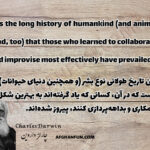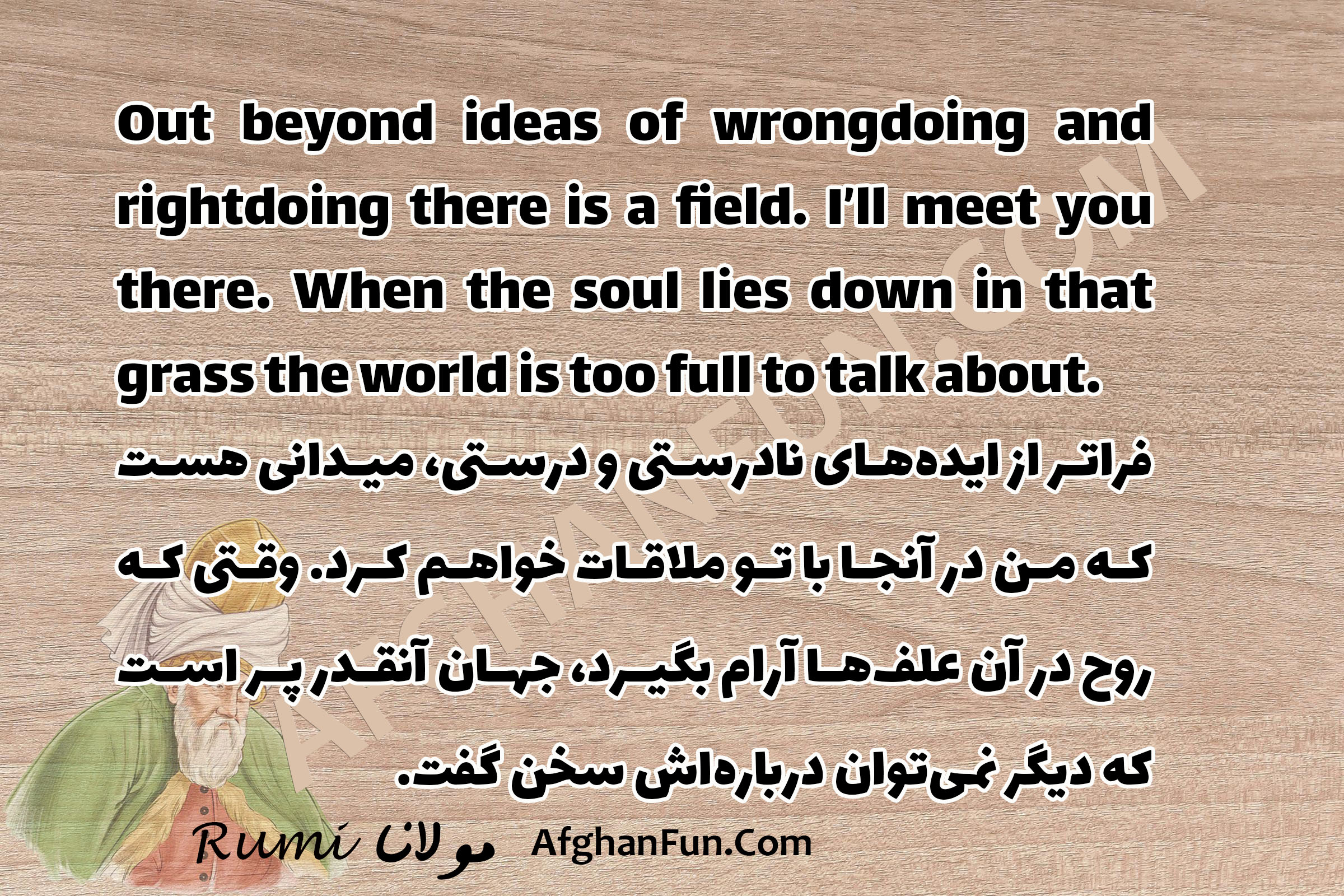Finding Peace: Rumi’s Invitation to a World Beyond Right and Wrong
Out beyond ideas of wrongdoing and rightdoing there is a field. I’ll meet you there. When the soul lies down in that grass the world is too full to talk about.
Rumi
Rumi’s Field: Beyond Judgment and Duality
فراتر از ایدههای نادرستی و درستی، میدانی هست که من در آنجا با تو ملاقات خواهم کرد. وقتی که روح در آن علفها آرام بگیرد، جهان آنقدر پر است که دیگر نمیتوان دربارهاش سخن گفت.
مولانا
این نقل قول از مولانا مفهومی عمیق و روحانی دارد که به یکی از جنبههای بالاتر از تفکر و منطق انسانی اشاره میکند. در اینجا، مولانا به جایی اشاره میکند که فراتر از دوگانههای معمولی مانند “درست” و “نادرست” است. در واقع، او از “میدانی” صحبت میکند که در آن مرزهای ذهنی و اخلاقی از بین میروند و انسانها در آنجا به تجربهای مشترک و معنوی دست مییابند که از تمام حرفها و قضاوتهای معمول آزاد است.
این بیان، نوعی پیوند با حقیقت مطلق و تجربهای از سکوت و آرامش درون است که فراتر از گفتوگوهای ذهنی و تفکرات معمولی است. در این “میدان” یا فضای معنوی، روح به حالت اصیل خود میرسد و دیگر نیاز به گفتار و تفصیل ندارد.
In the Field of Love: Rumi’s Path to Transcendence
МАВЛОНО ҶАЛОЛУДДИН МУҲАММАДИ БАЛХӢ
Фароғи аз фикрҳои надаруст ва дуруст, як майдон вуҷуд дорад. Ман бо ту дар он майдон вохӯрам.
Вақте ки руҳ дар он хасро мехобад, дунё он қадар пур мешавад, ки дигар наметавон дар бораи он гап зад.
Мавлоно мегӯяд, ки берун аз мафҳумҳои дурустӣ ва нодурустӣ, дар фазои зиндагӣ ҷоест, ки ҳама чиз аз ҳудудҳои инсонӣ берун аст ва ҳамаи чизҳоро якӣ мекунад. Ӯ ин ҷо ҳамчун ҷои иттиҳод ва оромии рӯҳ тавсиф мекунад, ки аз сарҳадҳои фикру ҳиссиёти одамӣ гузаштааст. Дар он макон, рӯҳ ором мешавад ва ҷаҳон он қадар васеъ мешавад, ки дигар онро бо сухан гуфта намешавад.
What Lies Beyond Good and Evil? Rumi’s Invitation
خارجًا عن أفكار الخطأ والصواب هناك حقل. سألتقي بك هناك.
جلال الدين الرومي
عندما يستلقي الروح في تلك العشب، يصبح العالم ممتلئًا لدرجة أنه لا يمكن التحدث عنه.
التحليل:
يشير مولانا في هذا المقطع إلى حالة من الوحدة والسلام الروحي تتجاوز الأحكام الأخلاقية والمعرفية التي نسجن أنفسنا بها. يمكن تلخيص المعاني الرئيسية للنقل على النحو التالي:
تجاوز الأحكام: يدعو مولانا إلى تجاوز الثنائيات التقليدية مثل الصواب والخطأ، الخير والشر، والتي تحد من إدراكنا للواقع.
الحقل كرمز: يرمز الحقل إلى فضاء واسع مفتوح لا يقيّد بالحكم والمعيار، وهو مكان للقاء الروحي.
استلقاء الروح: يشير هذا التعبير إلى حالة من الاستسلام والاتصال العميق بالوجود، حيث تتلاشى الكلمات والأفكار.
امتلاء العالم: عندما تصل الروح إلى هذه الحالة، يصبح العالم غنيًا جدًا بحيث لا يمكن وصفه أو التعبير عنه بالكلمات.
بمعنى آخر:
يرى مولانا أن الحقيقة المطلقة تتجاوز حدود اللغة والعقل، وأن السعي وراء المعرفة الحقيقية يتطلب منا أن نتجاوز قيود التفكير الثنائي وأن نفتح أنفسنا لتجربة مباشرة للوجود. الحقل الذي يشير إليه هو مكان للقاء الروح بالكون، حيث تتلاشى كل الانقسامات والحدود.
الرسالة:
تشجعنا هذه الكلمات على البحث عن الحقيقة داخل أنفسنا، بعيدًا عن الأحكام والمفاهيم الجاهزة. تدعونا إلى الاستسلام للوجود كما هو، والتوقف عن محاولة فهمه بشكل منطقي.
ملاحظات:
هذا المقطع يعكس فلسفة الصوفية التي تؤكد على أهمية التجربة الروحية المباشرة في الوصول إلى المعرفة الحقيقية.
يمكن تفسير هذا المقطع بأكثر من طريقة، حيث يترك مجالًا واسعًا للتأويل الشخصي.
هذا المقطع يعتبر من أشهر أقوال مولانا، وقد تم تفسيره وتحليله من قبل العديد من المفسرين والباحثين.
This Rumi‘s quote is deeply philosophical and spiritual, inviting the reader into a realm of transcendent experience that goes beyond ordinary concepts of morality, judgment, and even language. Let’s break it down and analyze it in depth:
1. “Out beyond ideas of wrongdoing and rightdoing there is a field.”
Meaning:
- Rumi begins by acknowledging that human life is often preoccupied with notions of right and wrong. These concepts, based on societal and personal judgments, shape much of how we interact with the world. However, Rumi points to a space beyond these binary oppositions—a “field” where such distinctions no longer apply.
- This “field” is a symbolic space, a metaphysical realm, where we transcend the dualities of good and evil, sin and virtue. It suggests a place of pure unity, where the soul can experience truth without the labels or moral constructs imposed by the mind. Philosophical Interpretation:
- The “field” can be understood as a reference to a higher state of consciousness—a state of unity with the divine, where the ego, which constantly creates distinctions and judgments, dissolves. In many mystical traditions, this state is referred to as oneness with the Divine, where dualities cease to exist.
- Rumi is speaking to a transcendent experience, one that is beyond the limitations of human reason and moral codes. It’s about moving past the constructs of the mind and embracing a more holistic, spiritual truth.
2. “I’ll meet you there.”
Meaning:
- In this line, Rumi is speaking directly to the listener or reader. He’s not simply describing this space of transcendence, but he is also inviting others to join him in this space. It’s an invitation to experience this higher truth, a call to leave behind the small, divisive concerns of the world and meet in this shared space of unity.
- This line implies that Rumi is not alone in this realization; he welcomes others into the experience. It speaks to the universal nature of spiritual awakening—it’s not something solitary or exclusive. It’s a collective invitation for anyone who seeks it.
Interpretation: - Rumi’s language is inclusive and communal, emphasizing the shared journey toward enlightenment and spiritual fulfillment. It’s a gesture of unity and love, where the separation between individuals falls away as all are called to a higher truth.
3. “When the soul lies down in that grass the world is too full to talk about.”
Meaning:
- The phrase “when the soul lies down in that grass” is a beautiful metaphor. The “grass” evokes images of nature, peace, and stillness. When the soul “lies down,” it is a symbol of relaxation, surrender, and deep communion with the universe. In this state, the soul is no longer restless, no longer trying to “do” anything, but simply being.
- The next part of the line, “the world is too full to talk about,” suggests that when the soul experiences this ultimate peace and oneness, language and words become inadequate. The truth that is experienced in this state is so vast, so profound, that it cannot be contained within the limitations of human language.
Interpretation: - This conveys the idea that ultimate spiritual experiences—those moments of deep connection with the Divine—are beyond the ability of human words to articulate. The fullness of the experience is beyond description; it is something that must be felt and lived.
- It’s also a nod to the concept of mystical silence. In many spiritual traditions, particularly within mysticism, silence is seen as a higher form of communication, a way of being in touch with the Divine that surpasses the limits of rational thought and speech. This line suggests that in this state of oneness, the soul transcends verbal expression and enters into a deeper mystical communion with the world.
4. Themes and Analysis:
- Transcendence of Dualities: Rumi is guiding us to a place beyond the constraints of dualistic thinking (right/wrong, good/bad). This is a call to move beyond egoic distinctions and see the world as interconnected, whole, and non-divisive.
- Oneness with the Divine: The “field” represents a spiritual plane where we can experience unity with all things. It’s a place where the boundaries between self and other, between the individual and the universal, disappear.
- Silence as the Ultimate Expression: The idea that the world is “too full to talk about” suggests that there are experiences and truths that cannot be adequately communicated through language. These are the kinds of ineffable truths that mystics encounter—truths that can only be directly experienced, not explained.
- Invitation to Awakening: Rumi’s invitation to meet in the field implies that this state of higher awareness is available to all. It’s not a solitary, elite experience, but something that can be accessed through spiritual surrender, contemplation, and connection to the present moment.
- Peace and Rest: The image of the soul lying in the grass evokes a sense of rest and tranquility. It suggests that spiritual awakening is not about striving or seeking, but about resting deeply in the present moment, letting go of effort, and allowing the soul to merge with the Divine.
5. Overall Interpretation:
This quote captures a core mystical idea: that spiritual truth is beyond conventional understanding, beyond intellectual or moral frameworks. It’s an invitation to experience life in its fullness, free from the judgments and distinctions that our minds typically impose. Rumi is pointing to a state of being, not doing, where language, thought, and ego fall away, and the soul finds unity with the universe. This is a call to experience the mystical—a reality that is too full, too profound to be captured by words, but can only be felt in the silence of the soul.
External links:
Works by Rumi at Project Gutenberg











